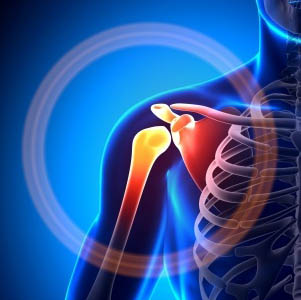


Many people know someone with an artificial knee or hip joint. Shoulder replacement is less common. But it is just as successful in relieving joint pain. Shoulder replacement surgery started in the United States in the 1950s. It was used as a treatment for severe shoulder fractures. Over the years, this surgery has come to be used for many other painful conditions of the shoulder. These include:
The shoulder is a ball-and-socket joint that enables you to raise, twist and bend your arm. It also lets you move your arm forward, to the side and behind you. In a normal shoulder, the rounded end of the upper arm bone (head of the humerus) glides against the small dish-like socket (glenoid) in the shoulder blade (scapula). These joint surfaces are normally covered with smooth cartilage. They allow the shoulder to rotate through a greater range of motion than any other joint in the body.
The surrounding muscles and tendons provide stability and support. Unfortunately, conditions like those listed above can lead to loss of the cartilage and mechanical deterioration of the shoulder joint. The result can be pain. You can have a stiff shoulder that grinds or clunks. This can lead to a loss of strength, decreased range of motion in the shoulder and impaired function. X-rays of the shoulder would show:
In severe cases, bone-on-bone arthritis may lead to erosion--wearing away of the bone Osteoarthritis is a common reason people have shoulder replacement surgery. Osteoarthritis is sometimes called "wear-and-tear" arthritis. It affects mainly older individuals in all walks of life. Over time, the shoulder joint slowly becomes stiff and painful. Unfortunately there is no way to prevent the development of osteoarthritis.
A severe fracture of the shoulder is another common reason people have shoulder replacements. When the shoulder is injured by a hard fall or car accident, it may be very difficult for a doctor to put the pieces back together. When the head of the upper arm bone is shattered, the blood supply to the bone pieces is interrupted. In this case, a surgeon may recommend a shoulder replacement. Older patients with osteoporosis are most at risk for a severe shoulder fracture.
Patients with a massive long-standing rotator cuff tear may develop cuff tear arthropathy. In this injury, the changes in the shoulder joint due to the rotator cuff tear may lead to arthritis and destruction of the joint cartilage.
Patients with arthritis typically describe a deep ache within the shoulder joint. Initially, the pain feels worse with movement and activity, and eases with rest. As the arthritis progresses, the pain may occur even when you rest. By the time a patient sees a physician for the shoulder pain, he or she often has pain at night. This pain may be severe enough to prevent a good night's sleep. The patient's shoulder may make grinding or grating noises when moved. Or the shoulder may catch, grab, clunk or lock up. Over time, the patient may notice loss of motion and/or weakness in the affected shoulder. Simple daily activities like reaching into a cupboard, dressing, toileting and washing the opposite armpit may become increasingly difficult.